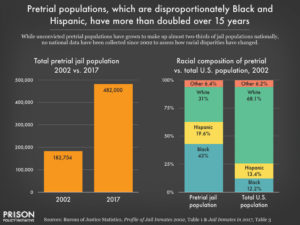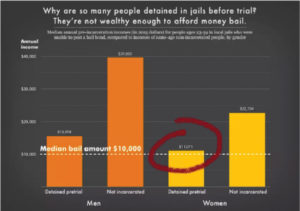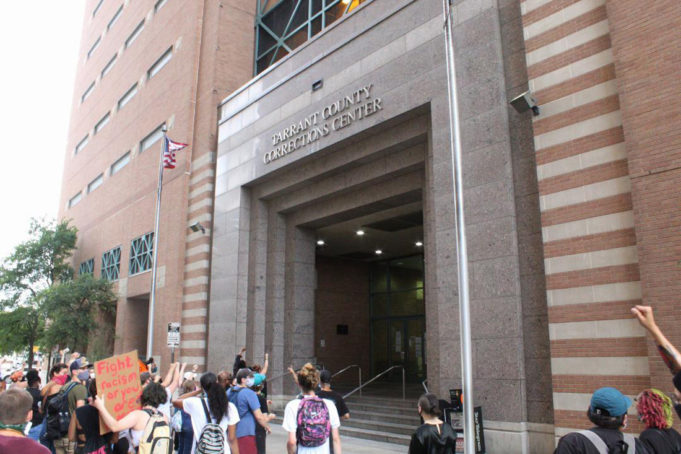Pamela Young remembers the smiles, tears, and stories that accompanied the recent release of 16 Black and Latinx inmates from the Tarrant County Jail. Earlier that day, Young and members of United Fort Worth, a grassroots minority rights advocacy group, paid the inmates’ cash bonds as part of a new initiative: the Tarrant County Community Bail Fund.
Young said she was unable to directly call the inmates due to jail policy, so United Fort Worth’s Criminal Justice Action Team couldn’t notify the men and women of their pending release.
“They were hugging us and were very thankful and grateful,” Young recalled. “Many said they had just prayed that they would be freed the night before, and today they were being bailed out. We had a lot of stories like that.”
The day was especially poignant given that it fell on Juneteenth — the date of June 19 that commemorates the emancipation of enslaved Black Americans following the end of the Civil War. As the United Fort Worth team chatted with the individuals who were released that day, they heard personal stories that recounted poverty and actions that Young called “crimes of survival.”
Young said one released inmate said he is homeless and would do “certain things” to be put in jail to avoid being on the streets during winter. Petty theft and criminal trespassing were the most common crimes the individuals reported as their cause of arrest and subsequent jailing.
The bond system is intended to incentivize defendants to show up to court. Bonds can basically be classified into two groups: monetary bonds and personal bonds. The former requires some type of payment (either upfront cash or a bail bond loan), while the latter requires no payment and simply relies on the presumed interest of the defendant to show up to court so that his or her criminal charges may be dismissed or plea bargained to a lower offense. Once a defendant’s case has been settled, he or she can often recoup the full amount of their cash bond.
“Money bonds tear families apart,” she said. “They criminalize being poor. This is something that our team is addressing as part of our effort to end mass incarceration.”
Proponents of the monetary bond system say it offers a legal mechanism to release defendants while holding them accountable for showing at future court dates. Critics of the practice note that bonds feed a $14 billion bail bond industry that creates a two-tier criminal justice system — one for rich defendants and one for poor ones.
Tarrant County has taken significant steps in recent years to speed up the process of issuing bonds as means of avoiding the types of litigation that have found the monetary bond system to be unconstitutional in other counties.

Those efforts, according to one county official, have included increasing the use of personal bonds.
Ken Good said the state’s bond program ensures accountability on the part of defendants.
“If bail was eliminated, the criminal justice system would collapse,” said the attorney and board member for Professional Bondsman of Texas. Without a system in place to bring defendants to court, “victims would never have closure, and career criminals would see this as a green light to commit more crime.”
Around three-fourths of men and women held in Texas county jails have not been convicted of the crime they have been charged with yet remain in jail because they cannot afford to post bond, according to Texas Appleseed, a volunteer and lawyer-led nonprofit that focuses on social and economic justice issues. In most counties, Texas Appleseed reports, risk assessment tools are not used to determine the likelihood that a defendant would commit a new crime or fail to appear in court if released. Personal bonds are rarely used, the nonprofit added.
Young and members of her nonprofit are calling for the abolition of cash and bail bonds in Tarrant County. Defendants have a vested interest in clearing their name of criminal charges by showing up to court, with or without the threat of losing bond money, Young said. Criminal justice reformers have won major legal battles recently in the battle to end Texas’ bond system. Fort Worth protest leaders want to build on that success by ending the bail bond system locally and redistributing law enforcement funds toward jail diversion programs that would better serve the community.
*****
The country’s third-largest criminal justice system was recently at the center of historic bail reform. Last July, Harris County officials voted to settle a lawsuit that argued that indigent defendants were denied basic Constitutional freedoms due to longstanding bail practices in Harris County, whose largest city is Houston.
Following news of the settlement, litigants Civil Rights Corps (a nonprofit that fights systemic injustice) said, “We believe the agreement lays the groundwork for a system that will recognize the humanity of the people who pass through it, treat them with dignity, and value their freedom.”
Commissioners worked to reform the county’s bond system by implementing policies that ensured misdemeanor arrestees were promptly released after booking and defendants had access to public defenders, among other reforms.
Chief U.S. District Judge Lee H. Rosenthal approved the reforms last November, stating that “no system can guarantee that all those accused of misdemeanors who are released on personal bonds — rich or poor — will appear for hearings or trial or that they will commit no crimes on release. But Harris County can stop systematically depriving indigent misdemeanor defendants of their Constitutionally protected rights by detaining them simply because they cannot afford to post money bail.”

Dallas County has similarly faced a recent lawsuit that has targeted the disparities caused by cash and bail bond systems. In 2018, U.S. District Judge David Godbey ruled that Dallas County had to dismantle its bail system after a lawsuit brought to light gross disparities in who could afford to bond out of county jail and who couldn’t. The lawsuit is currently tied up in the 5th U.S. Circuit Court of Appeals. David Villalobos, whose Texas Organizing Project is a lead plaintiff in the legal battle, said delays at the Court of Appeals haven’t stopped his community organizing group from pushing forward with bail reform efforts in Dallas County and elsewhere.
“We’ve identified judges as being able to reform the cash bail system,” he said.
Texas Organizing Project members have taken to speaking out during courtroom sessions, holding rallies just outside courtrooms, and livestreaming protests to raise public awareness of the role judges play in giving indigent defendants unaffordable bail amounts.
Bail supporter Good said the argument that bonds target the poor makes for good headlines but simply isn’t true. The problem, he said, deals with the “process of moving large numbers of people efficiently and cost-effectively through the jails of our largest counties without taking advantage or losing track of anyone, including poor people,” he said. “Therefore, we need to set up procedures that will address the problem and at the same time protect the rights of the poor. I do not believe that the issue is first-time offenders who are indigent who are being kept in jail, but it is individuals who have been arrested and who are repeat offenders. Denying these people a [personal bond] is not an issue of poverty. It is an issue of accountability and public safety.”
Being a repeat offender is one factor that is commonly considered by judges when choosing bond amounts, according to common legal practice.
The legal and ethical arguments against monetary bail go well beyond the constitutionality of the system. Conviction rates are the prosecutorial system’s raison d’être, and the monetary bond system is seen by many as a tool that prosecutors can use to pressure defendants into pleading guilty. Brooklyn public defender Scott Hechinger told the online media outlet Mic in 2017 that he came into his role as a public defender with an idealistic outlook on how he could help local defendants.
“But no matter how hard I tried, no matter how solid my legal theories were, no matter how much investigation I did, bail determined outcomes,” he said.
Hechinger, as many in the criminal legal profession know, was referring to the emotional stress and trauma that occur when a man or woman is jailed. Conditions inside Tarrant County Jail are squalid. Putrid odors from stagnant toilets fill cramped, filthy holding cells, based on conditions that I have observed and documented. Any reasonable person would desire to be free of those conditions. That’s just human nature. If bond conditions cannot be met, Tarrant County District Attorney (TCDA) prosecutors offer a way out: a guilty plea.
The TCDA’s conviction rate is partly based on their plea bargaining system, one former inmate told me. By phone, Kevin Jones described how county-level prosecutors use the dangling carrot of freedom to pressure Black men like himself into signing off on crimes they either did not commit or committed under mitigating circumstances that could lead a jury toward bestowing exoneration. Jones, who said he had served time for attempted murder, currently faces two separate charges of possession of under one gram of a controlled substance. A Tarrant County magistrate judge set his bail for the second possession charge at $20,000 on February 2, 2018.
The convictions are based on “bail that you cannot make,” he said. “You begin to get weary of the food and the non-visitations. Now, here comes the district attorney’s office, and they offer you a plea bargain deal. There are a lot of cards to be considered. If you do not take the offer, you could be facing a two- to 20-year sentence. They offer 18 months of state jail. If you take this to trial, they will push for 20 years. If you take the plea bargain, you get 18 months. You may not be guilty of this charge, but 18 months sounds a lot better. They get their conviction, and you get the lesser sentence. Everybody is happy with that, supposedly. Well, I’m not happy with that. This district attorney threatened me with 20 years for possession of a controlled substance under one gram. That’s unheard of.”

Photo courtesy of United Fort Worth’s Criminal Justice Action Team
United Fort Worth’s Young recounted her recent online viewing of a Tarrant County criminal court bond hearing. At the onset of the ongoing COVID-19 pandemic, court hearings were shut off from the public but aired live via YouTube. A Black man who appeared to be in his 50s was described by his defense lawyer as having tested positive for COVID-19, Young said. The defendant, along with his lawyer, was asking the judge for a reduced bond that would allow the inmate to leave Tarrant County Jail. TCDA prosecutors allegedly began digging into the man’s criminal records.
“They start bringing up this man’s records,” Young said. “What broke my heart was his response.”
Yes, I was convicted of that, but I didn’t do it, the man allegedly said. I just pled to get out of jail.
“You have folks walking around with these long rap sheets,” Young said, “people of color often times, for things that they did not do, but they felt they had no other choice but to plead out so they could get home and not lose their job, or maybe they just didn’t want to be in a cage anymore. They pled out, and now it’s on their record. Many of them didn’t know what the consequences would be for pleading out.”
I asked the local district attorney’s office if its members were aware of incidents when the monetary bond system pressured indigent inmates to plead guilty.
A spokesperson for the DA said in an email that “plea paperwork states that the defendant agrees he/she is ‘mentally competent and my plea is knowingly, freely, and voluntarily entered. No one has threatened, coerced, forced, persuaded, or promised me anything in exchange for my plea.’ When pleading in front of a judge, the defendant must also confirm that he/she is pleading guilty because he/she is guilty and for no other reason. It is the duty of the defense attorney to communicate these requirements clearly to the defendant.”
Being able to bond out can determine a defendant’s ability to win a case. In a 2019 article, Prison Policy Initiative said, “Being jailed before trial … can throw a defendant’s life into disarray and make it more likely that they will plead guilty just to get out of jail.”
Citing data from the Bureau of Justice Statistics and other sources, the criminal justice think tank found that young Black men are 50% more likely to be detained pretrial than white defendants due to the higher bond amounts that are often levied against Black men and the lack of financial resources Black men have compared to white defendants.
Bonds are also more expensive, by an average of $10,000, for Black men compared to white men across the United States criminal justice system, the Prison Policy Initiative found. The think tank called for greater record-keeping and access to jail records so “local advocates and future researchers [can] find the data they need to measure racial disparities in pretrial justice processes and work to eliminate them.”
Defendants can’t “prepare for a trial from a jail cell,” Young said. “The conviction rate goes way up for people who are not released pretrial. What are you going to do inside a jail cell? The jury sees them in a much different light when they come to court. They are coming out in shackles instead of as a free person. That also plays into the higher conviction rate of people who are not released pretrial.”
*****
Bail bond companies are typically adorned with few frills. Throughout Tarrant County, you’d be hard-pressed to find one that features anything but a modest storefront and low-key furniture. Funding the industry are 10 insurers who underwrite around $14 billion in bonds each year while earning around $2 billion in annual profits, according to a 2017 study by the nonprofit civil rights advocacy group Color of Change and the American Civil Liberties Union (ACLU).
Bail supporter Good said the majority of bondsmen in Texas do not charge interest, nor do they give into predatory lending practices.
“The bail bond industry is made up of small business owners across the state,” he said. “Some of our members are second- and third-generation bondsmen. The amount that they charge is something that is competitive, and defendants and their families are very adept at comparing what one company will charge versus another company.”
As far as reforms go, Good said his organization supports the use of reasonable bail schedules coupled with procedures to protect the poor.
“We also support legislation that mandates that courts are required to remagistrate anyone still in the jail 72 hours after bail is set to ensure that they are not lost or forgotten,” he added.
In the wake of the Harris County and Dallas lawsuits, Tarrant County commissioners and Sheriff Bill Waybourn took steps to ward off potentially expensive litigation and embarrassing national attention. During a November 2017 commissioners court meeting, elected officials weighed the costs and benefits of hiring additional criminal judges and staff to speed the release of prisoners from the Tarrant County Jail.
“Harris County is not the end of these lawsuits,” commissioner Roy Charles Brooks said. “They will soon come after Tarrant County on those same issues. It could easily cost us more than a half million in court costs and fines.”
The commissioners were being briefed on a two-pronged approach to hasten the processing of inmates. One overhaul involved creating a centralized system that could set bond amounts on perceived risks of meeting court dates and recommended guidelines.
“Constitutional rights exist seven days a week, not just five,” one county official said, describing the need for the revamped services.
Waybourn spoke about changes he was preparing to make regarding who was accepted into Tarrant County Jail and when. Previously, the county jail accepted individuals only after their criminal case was accepted by the district attorney’s office. In effect, individuals being detained in Tarrant County cities, such as Arlington or White Settlement, were having to wait in those municipalities’ jails until paperwork was completed for the inmates then to be transferred to the Tarrant County Jail, where bond would be assessed.
That practice also violated Article 2.18 of the Code of Criminal Procedure that states, “When a prisoner is committed to jail by warrant from a magistrate or court, he shall be placed in jail by the sheriff.”
Waybourn said that bringing arrested persons directly to the county jail allows county magistrate judges to assess a bond amount more quickly and gives inmates faster access to support services by MHMR of Tarrant County, the state agency that provides mental health and addiction services.
On January 1, 2018, two additional full-time magistrates and two full-time support staff began working at Tarrant County Jail. The revamped system now allows for 11 magistrations a day, seven days a week — up from two magistrations per weekday and one per weekend. The annual cost for the revamped system, according the most recent data available, is $520,148.
Gregory Shugart, Tarrant County Criminal Courts administrator, said the county recently implemented a new remote magistration program for Arlington. The new setup allows detainees to post bail in Arlington without the need of being transported to downtown Fort Worth, he said.
“It has taken a while to get here,” he said. “COVID probably accelerated the process. We have a long-term vision of [offering more] magistrating remotely so the defendants who would normally get out [of jail] downtown can get out locally. The longer you stay in jail, the more likely you are to recommit a crime or lose a job. All these things create a domino effect. Our Constitution believes that everybody has their right to a day in court. They can argue their case in court without having to sit in jail.”
Personal bonds have been available in Tarrant County since 1965. Shugart said they were historically underutilized by local courts. As part of its efforts to reduce the burden that bonds can pose on indigent inmates, Tarrant County began increasing the percentage of personal bonds issued to detainees. Shugart said that around 40% of individuals who are charged with misdemeanors and 20% of the overall intake population are issued personal bonds.
The court appearance rate for individuals who were issued personal bonds was higher than that of defendants who were issued monetary bonds, he said.
“Low-level and first-time offenders are more apt to follow the rules and procedures” of the court system, he said. “I would wager that if you were put in jail [for the first time in your life], you would do everything you could to make sure that issue was behind you so you can continue to do what you enjoy in life.”
Tarrant County defendants now have access to text and email reminders about court appearances.
“That wasn’t an option before central magistration,” he said. “Your doctor texts you appointment reminders. I don’t see why our courts can’t.”
*****
Weeks after the Juneteenth release of the 16 Tarrant County Jail inmates, their stories continue to haunt Young. The low-level crimes committed by the released defendants coupled with the fact that many languished in jail because they could not afford a $100 bond has highlighted failures at all levels of society in Fort Worth, she said. Jailers informed Young that day that one inmate whose bond had been paid by United Fort Worth had declined to leave his cell.
“In Tarrant County, there is such a lack of a safety net and support for disenfranchised poor people and people of color who have been disproportionately railroaded by every institution and system,” she said. “Some folks find it safer to be in a jail. I wasn’t able to talk to him, but maybe he needed to stay there so he could have medication and shelter. It is a sad situation being at the jail all day, watching folks come out, and hearing their stories about how this city and society has utterly failed them.”
California’s legislature and governor signed a law that abolished monetary bonds in mid-2019, but bail bond companies subsequently petitioned for a statewide referendum on the law. If California voters choose to eliminate monetary bonds this November, the state will become the first to eliminate the requirement to post bail for release after arrest.
The arrests of protesters across the United States have led to a surge of bail fund donations, and many civil rights groups believe the effects could be long-lasting. Reporting by NPR found that, following the killing of George Floyd, a Minneapolis Black man, by a white police officer as three other officers watched, more than 900,000 individuals donated to the Minnesota Freedom Fund, which bails low-income people out of jail or immigration detention. In 2018, the fund reported a total budget of $150,000. Just weeks after Floyd’s killing, the group said it had received $31 million.
Villalobos with Texas Organizing Project said that his group is planning to support reform-minded judges. Ideally, he said, monetary bond would be abolished in the Lone Star State. Bond reform is just one component of comprehensive criminal justice reform, he added.
“There should be a category or arrest where [defendants] are automatically released” on a personal bond after being processed, he said, “whether it’s for marijuana possession or criminal trespassing not connected to domestic violence. We also would like to see legal counsel present for people going through a magistrate hearing.”
Young said funding of the criminal justice system is linked to criminal justice reform.
“You hear people talk about defunding the police,” she said. “That is tied to this issue. When we say defund the police, we are talking about funding programs that actually keep us safe. The police do not keep us safe. Resources do. A fully resourced community would have something in place for a young man who has nothing. They would have something in place for a person who has a substance addiction.”
Young sees an opportunity to provide greater community resources to jail diversion programs by reallocating a portion of the Fort Worth police department’s budget toward community programs and mental health treatment centers. The projected budget for the Fort Worth police department this year is $352,893,268, according to the city.
County jails should be reserved for inmates who are a danger to society, she added.
“If there is probable cause to believe that someone is going to hurt people and there is evidence, that should definitely be taken into account before you release someone to possibly victimize more people,” she said. “Outside of that, folks need to get the court date and go home and prepare for their trial. They need to get with their attorney, keep working, and keep taking care of their families. They should not be sitting in a cage simply because they do not have $500.”













Everything is wayyyyyycisssst!
Waiting 15 hours after posting a cash bond to get out of tarrant county jail is ridiculous
Shoot I was kept all weekend let out Monday when my bond was paid Friday…..and I sat in holding watching the guards watch youtube instead of doing the release paperwork…taxe payers money hard a work.